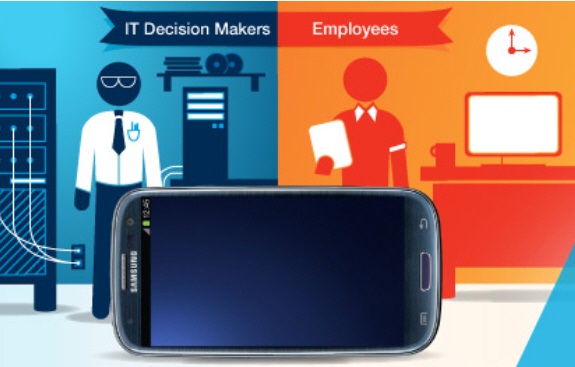Samsung recently commissioned IDG Research Services to provide research targeted at identifying the behaviors and attitudes of IT executives and consumers toward BYOD. There are some interesting findings in the report - especially as they relate to gaps between execs and consumers (the workforce), but overall we all know that BYOD has already become entrenched and there wasn't anything in the report to suggest otherwise.
The most immediate and most pertinent finding from the study is that 24 percent of consumers currently use a smartphone or tablet as their primary, work-related computing device, and that number can be expected to double over the next five years. While both IT execs and consumers indicate support for BYOD and the work-life balance benefits it typically enables, the study highlights key synergies - as well as the critical gaps we noted above - between IT executives and their employees that will need to be addressed as BYOD moves quickly forward to become the norm.

Top findings of the study include the following:
- 85 percent of companies support BYOD today.
- More than 70 percent of IT executives surveyed believe companies without a BYOD strategy will be at a competitive disadvantage.
- 81 percent of IT decision makers and 78 percent of employees believe that having a single mobile device helps balance employees’ work and personal lives.
There isn't much to argue with here - it is in fact exactly along the lines of what we would have expected panelists to say. And yet, though there is clearly similar thinking and harmony between the workforce and IT decision makers, gaps clearly exist between IT decision maker and employee outlooks. This is especially true relative to device priorities and preferences, both of which underscores a real disconnect between what IT executives need in order to achieve business goals and what employees need to do their jobs.
The largest difference between the two groups in opinion - and perhaps the most interesting to note - is where each group places its priorities. As might be expected, for IT decision makers their primary goal is to ensure that users have access to productivity apps such as CRM. This makes sense of course, as productivity apps tend to be what the typical workforce spends most of its collective time with. On this score 49 percent of IT decision makers agree that productivity app access is the highest priority.
Security is Critical for Enterprise Mobility
The disconnect between the two groups here is that only 28 percent of employees agree with that priority assessment. A significant 43 percent of surveyed employees believe the top priority is the ability to share large files. Only 23 percent of IT executives agree with this. Sharing large files (or in fact any corporate files of any size) is a hot issue for enterprises.
Sensitive data sits in these files, and businesses - especially IT, are very concerned with the safety of that data. A key BYOD issue here is related to the easy availability of cloud-based public storage capabilities such as Dropbox. Employees are far less concerned with the inherent potential security issues related to taking corporate data files and simply saving them up to the public cloud. Users can certainly then download the files to home computers or their mobile devices and in many cases simply sidestep securing those files.
We ourselves are of the belief that BYOD has already reached its inflection point and is now giving way to what we are referring to as BYOS - Bring Your Own Storage - which in fact can prove extremely harmful to any business organization. We believe that it is BYOS that is now emerging as the next major headache for IT. It should come as no surprise then that the most significant concern of both the workforce and IT executives uncovered by the Samsung study is the issue of security.
While 49 percent of the workforce surveyed believes that the mobile device will become the primary computing device for work-related activities within the next five years, achieving this level of mobile productivity may depend on whether or not hardware and software providers can address security concerns. The great majority of both IT executives and employees - 84 percent and 74 percent respectively - identified the issue of device security as the most important factor influencing both present and future BYOD policies.
The BYOD study having been commissioned by Samsung, it's only fair to note that Samsung offers a number of enterprise-targeted security capabilities - whether directly through Samsung and directly supported on various enterprise-grade Samsung devices (such as the Galaxy S III and Tab tablets) or through a variety of partners that include MDM and VPN vendors. These services include mobile device management (MDM), VPN, Exchange ActiveSync and encryption capabilities. Samsung refers to these collective services as SAFE (Samsung For Enterprise - formerly Samsung Approved For Enterprise).
Samsung's goal for SAFE is to allow it to claim the ability to eliminate fragmentation between device types and OS versions, and to create consistency across devices so that once one SAFE device is approved by a corporation’s IT department, other SAFE devices can be easily added to any approved lists for BYOD.
There is more worth exploring in the Samsung BYOD Index study itself. Survey methodology, panelist profiles, and access to the comprehensive survey results - including a number of useful infographics are available through the report.
Edited by
Brooke Neuman  QUICK LINKS
QUICK LINKS